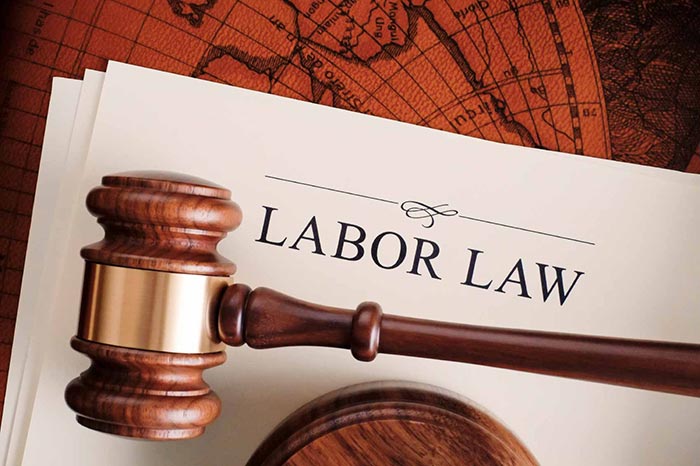INTRODUCTION:
Labour law denotes an area of law which specifies the status of worker, their trade union and government. It’s the one which helps in safeguarding the rights of all the workers, their association, their compensation and also establishing and bridging relations with the authorities in charge. It is more of a code that extends to all employees as well as the employers, ensuring that they know their rights and making it compulsory for them to follow legal structures that have been set out regarding labour issues. Labour law is often misapprehended as if it was Employment law. On the contrary Employment law is the branch of law which concerns one of the parties of the employment contract, i.e. the relationship of the worker and the employer.
Labour law dwells on establishing a legal framework of attaching protagonists, the labour and the organized workers, in a more serene conflict. It has to do with the activities related to the labour-relations, the role of trade unions, the working environment, the nature of work conditions, strikes and the protection of the labour. Employment law or Employment Standards law, predominantly seeks to regulate through statutes the workplace conditions, working hours, remuneration, etc, all of which almost clusters around Labour law absorption and Employment standard laws more often to workers or employees and their way of working.
Understanding the origins of labour law can be attributed to the need to mitigate the conflicts which occur between the rights of workers and the adverse conditions which undermine these rights. In this context, the Indian regime of labour laws is quite elaborate because there are about sixteen legislations that protects labourers in the country. Most of these legislations have developed during the British colonial period of India and the legal frameworks which are referred to have continued to be applicable over 76 years after independence of India.
The Constitution places the onus of care for the workers and labourers unreserved on the State in India. The power to make these laws is specifically made part of the Constitution of India 1950 in Part-IV in respect of Directive Principles of State Policy (“DPSP”) in Article 39, 41, 42, 43, 43A and 54. This provides for the Constitution’s description of labour as a subject which belongs to the concurrent list within the constitution where there are provisions made for both the Central Government and State Governments to make laws. Also, international treaties and agreements or conventions are also an important aspect considering that these laws are invoked in a lot of cases since the International Labour Organization is active in Chile. However, there are eight core conventions ILO laws that are followed to promote these labour relations in India, and yet the country was unable to adhere to four of them.
In short, labour law has been in a dynamic growth process shaped by demands from workers for better conditions and responses from frightened employers wary of rising costs. The establishment of the international bodies, such as the International Labour Organisation (ILO), was also historically significant in tackling labour issues at a global level. The immediate aftermath of World War I, consisting of the treaty of Versailles and the influence of the Whitley commission, established the platform for progressive labour reforms. The importance of safeguarding workers’ rights was realized and recognized by nations worldwide; unions were also given a greater role to play. Collective bargaining emerged as a critical tool used to secure incremental improvements for workers. So, the history of labour law, it reflects today’s tensions of an employer and a worker, and thus would always require an endless dialogue and reform to balance out the interest of parties.
PURPOSE OF LABOUR LAWS:
Adapted to the economic and social challenges of the new world of work, labour legislation has three very important functions: it constructs a legal framework to enable productive individual and collective employment relationships and, in this manner, a productive economy. It provides a framework within which the interaction of employers, workers, and their representatives with work-related issues can occur, thereby being an important vehicle for achieving harmonious industrial relations based on workplace democracy.
It’s the evident and persistent reminder and also the guarantee of core principles and rights of labour that have widely achieved and recognized social, and it determines the ways in which those principles and rights are to be enforced and implemented.
But practice experience shows that labour legislation can only be effective when responsive to the condition of the labour market and to the needs of the parties involved. It is the most effective way to consider these conditions and needs completely when the concerned parties are involved closely in the formulation of legislation through social 6 dialogue processes. This involvement of stakeholders is very important to the development of a broad base of support for labour law and in making its applications possible within and outside the formal structured economic sectors.
LABOUR LEGISLATION:
The legislations can be categorized as follows:
1) Labour laws enacted by the Central Government, where the Central Government has the sole responsibility for enforcement.
2) Labour laws enacted by Central Government and enforced both by Central and State Governments.
3) Labour laws enacted by Central Government and enforced by the State Governments.
4) Labour laws enacted and enforced by the various State Governments which apply to respective States.
(a) Labour laws enacted by the Central Government, where the Central Government has the sole responsibility for enforcement
1. The Employees’ State Insurance Act, 1948
2. The Employees’ Provident Fund and Miscellaneous Provisions Act,1952
3. The Dock Workers (Safety, Health and Welfare) Act, 1986
4. The Mines Act, 1952
5. The Iron Ore Mines, Manganese Ore Mines and Chrome Ore Mines Labour Welfare (Cess) Act, 1976
6. The Iron Ore Mines, Manganese Ore Mines and Chrome Ore Mines Labor Welfare Fund Act, 1976
7. The Mica Mines Labour Welfare Fund Act, 1946
8. The Beedi Workers Welfare Cess Act, 1976
9. The Limestone and Dolomite Mines Labour Welfare Fund Act, 1972
10. The Cine Workers Welfare (Cess) Act, 1981
11. The Beedi Workers Welfare Fund Act, 1976
12. The Cine Workers Welfare Fund Act, 1981
(b) Labour laws enacted by Central Government and enforced both by Central and State Governments
1. The Child Labour (Prohibition and Regulation) Act, 1986.
2. The Building and Other Constructions Workers’ (Regulation of Employment and Conditions of Service) Act, 1996.
3. The Contract Labour (Regulation and Abolition) Act, 1970.
4. The Equal Remuneration Act, 1976.
5. The Industrial Disputes Act, 1947. 12
6. The Industrial Employment (Standing Orders) Act, 1946.
7. The Inter-State Migrant Workmen (Regulation of Employment and Conditions of Service) Act, 1979.
8. The Labour Laws (Exemption from Furnishing Returns and Maintaining Registers by Certain Establishments) Act, 1988
9. The Maternity Benefit Act, 1961
10. The Minimum Wages Act, 1948
11. The Payment of Bonus Act, 1965
12. The Payment of Gratuity Act, 1972
13. The Payment of Wages Act, 1936
14. The Cine Workers and Cinema Theatre Workers (Regulation of Employment) Act, 1981
15. The Building and Other Construction Workers Cess Act, 1996 28. The Apprentices Act, 1961
16. Unorganized Workers Social Security Act, 2008
17. Working Journalists (Fixation of Rates of Wages Act, 1958
18. Merchant Shipping Act, 1958 32. Sales Promotion Employees Act, 1976
19. Dangerous Machines (Regulation) Act, 1983
20. Dock Workers (Regulation of Employment) Act, 1948
21. Dock Workers (Regulation of Employment) (Inapplicability to Major Ports) Act, 1997
22. Private Security Agencies (Regulation) Act, 2005
(c) Labour laws enacted by the Central Government and enforced by the State Governments
1. The Employers’ Liability Act, 1938
2. The Factories Act, 1948
3. The Motor Transport Workers Act, 1961
4. The Personal Injuries (Compensation Insurance) Act, 1963
5. The Personal Injuries (Emergency Provisions) Act, 1962
6. The Plantation Labour Act, 1951
7. The Sales Promotion Employees (Conditions of Service) Act, 1976
8. The Trade Unions Act, 1926
9. The Weekly Holidays Act, 1942 13
10. The Working Journalists and Other Newspapers Employees (Conditions of Service) and Miscellaneous Provisions Act, 1955 47. The Workmen’s Compensation Act, 1923
11. The Employment Exchange (Compulsory Notification of Vacancies) Act, 1959
12. The Children (Pledging of Labour) Act 1938
13. The Bonded Labour System (Abolition) Act, 1976
14. The Beedi and Cigar Workers (Conditions of Employment) Act, 1966
PAYMENT OF BONUS ACT,1965:
The Bonus Act on payment of bonus provides for the payment of bonus to persons employed in certain establishment taken on the basis of profits or on the basis of production or productivity and for matters connected therewith.
It extends to the whole of India and is applicable to every factory and to every other establishment where, on any day of an accounting year, 20 or more workmen are employed.
Eligibility to Bonus
Bonus is payable to all employees engaged in any capacity, skilled, unskilled, managerial or supervisory, etc. drawing wages/salary up to Rs. 10,000 p.m. Provided that he has worked for not less than 30 working days in any accounting year.
Where an employee has not worked for all the working days of an accounting year, the minimum by way of bonus one hundred rupees or, as the case may be, of sixty rupees if such bonus is higher than 8.33 percent, of his salary or wage for the days he has worked in that accounting year, shall be proportionately reduced.
However, employees of L.I.C., Universities and Educational institutions, Hospitals, Chamber of Commerce, R.B.I., IFCI, U.T.I., IDBI, NABARD, SIDBI, Social Welfare institutions are not entitled to bonus under this Act.
Lawyers, as professionals, typically fall outside the purview of the Payment of Bonus Act, 1965, as the Act primarily applies to employees in specific industrial and commercial establishments.
Are Lawyers Eligible to Bonus Under the Payment of Bonus Act, 1965?
The Payment of Bonus Act, 1965 was enacted in India as legislation to provide for the payment of bonuses to employees in a certain industry for the betterment of the standard of living of workers and there should not be an unequal division of profits by employers in comparison to workers. It applies to certain industrial and commercial establishments and aims to regulate the relationship between employers and employees concerning bonuses.
But does this tell us, an important question, are Lawyers entitled to a bonus under this Act?
No, because lawyers are not covered by the Payment of Bonus Act, 1965. There are several legal, professional, and statutory reasons for this exclusion.
What is the Payment of Bonus Act, 1965?
The Payment of Bonus Act applies to-
- Employees in establishments employing twenty or more workers.
- For workers with a basic wage/benefits threshold below ₹10,000 per month, which was later increased to ₹21,000 per month.
- Factories and institutions or other premises undertaking industrial, commercial or business activities.
According to the Act, an “employee” means:
A person (other than an apprentice) whose wages or salary and any remuneration wholly or partly in cash is being paid or allowed or is likely to be paid or allowed to him either directly by or through a contractor by a factory or other establishment to an employee for doing any skilled, unskilled, manual, supervisory, managerial, administrative, technical, or clerical work.
Main Essentials of the Bonus Act:
Eligibility: The Payment of Bonus Act has declared that the employees that have done work for at least 30 days in an accounting year are liable to get bonus payments. The bonus amount is generally based on the profits of the establishment and may lie between a minimum of 8.33% to the maximum of 20% of the salary and wage earned by the employee.
Applicability: The Act applies to “factories” and “establishments” as defined under the Act, thus covering industrial or commercial entities but leaving out other types of institutions like hospitals, educational institutions, and professional services such as legal practices.
Why Lawyers Cannot Claim Bonus Under the Payment of Bonus Act
1. Lawyer are professionals, not employees:
Attorneys, being broadly defined professionals who usually either practice personally or practice in association with other attorneys, cannot be called “employees” under the Payment of Bonus Act. The nature of the relationship of an attorney with his client or a law firm is more contractual in nature and cannot be termed as an employer-employee relationship.
Independent Practitioners: Lawyers often practice as independent practitioners in which they handle their clients, and send them bills for the services provided, besides maintaining own legal practices. The independent practitioners are not a kind of employees; therefore, Payment of Bonus Act 1965 does not apply to them.
Associates in Law Firms: Lawyers, even those working in law firms, are not employees in the same sense as factory workers or office workers. Instead, their association with the firm is built on professional expertise rather than a formal employment contract under the Act. The character of the enterprise of the law firm is service-based. The incentives for lawyers’ work either through preset salaries, profit sharing or performance bonuses fall outside the Act.
2. Nature of Work in Legal Services:
The Payment of Bonus Act primarily applies to industrial and commercial establishments engaged in manufacturing, trade, or commerce. On the other hand, law firms are basically professional services which differ from industries or commercial businesses. The definition of the Act clearly envisions the benefitting workers in industries because in these industries their employees are engaged in manual, clerical, or technical work. Legal work is highly professionalized and of specialist nature and, therefore, does not come into this category.
Thirdly, the income of the legal professionals does not come close to wages or salaries as observed in most industries. It is only received as a fee paid for professional services rendered to clients. This further separates their profession from the regular employees in most other sectors.
3. Exemption under the Act:
The following are the specific sectors that the Payment of Bonus Act disqualifies itself from employees in educational institutions, in hospitals, and other charitable institutions, for example. Similarly, the law firms professional servicing organizations are not covered. This is because the nature of their operation is expected to differ from that of industries where the profits-to-the-workers kind of share- sharing mechanism is better understood, the law firms.
4. No Legislative Intent to Include Lawyers:
The Payment of Bonus Act was obviously a relief to the working class, as it was designed to help the personnel of the industrial sector, who engaged in low-wage, mostly manual-labour activity; never for those at the other end of the scale, like lawyers, doctors, or accountants who are highly specialized professionals. These professions have their own professional bodies, for example, lawyers whose professional body is the Bar Council, and operate under different sets of ethical and professional guidelines governing compensation and benefits.
At last, lawyers are not eligible for a bonus under the Payment of Bonus Act 1965 because they do not fit the definition of employees outlined by the Act. The unique nature of the profession, marked by independent practice and specialized knowledge distinguishes lawyers from the workers and sectors covered by the Act. Lawyers have contractual and profit sharing structures making the Payment of Bonus Act irrelevant to their situation. Since the profession follows its own ethical standards and compensation practices any bonus or profit sharing arrangement for lawyers is typically discussed, within the profession rather than being governed by the regulations set forth in the Payment of Bonus Act.
Sources:
- ipleaders by Law Sikho
- Labor act by ncib.in
- Taylor and Francis’s Article on labour laws





